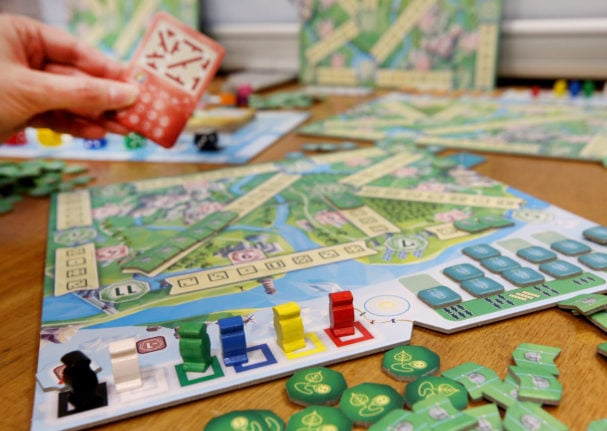Anyone who’s ever tried to learn a new skill will know how it goes: you start off full of enthusiasm and make some great progress, but then at some point, the excitement fades and all those Teach Yourself books start to gather dust on your shelves.
Learning a language can be just the same, especially if you don’t switch things up occasionally.
With a language as tricky and grammar-heavy as German, it’s a great idea to find some quirky ways to introduce a bit of fun into your learning once in a while.
So if you’re bored of doing the same old things, here are six ideas to get you back on track.
1. Integrate it into your hobbies
Traditional language courses can be a great way to learn, but learning in a classroom setting can also feel dry and theoretical.
In reality, languages are meant to be used in real-life, everyday settings – from debating politics with friends to ordering brunch at the weekend.
That’s why it can be a great idea to find a practical way to apply your German skills by doing something you already love to do. If you’re a passionate chef, why not cook a new dish in German from start to finish? You can start by finding German-language recipes online, write your shopping list in German, and follow the instructions in German at every step.

For DIY enthusiasts, learning the names of different tools and materials, as well as any useful verbs related to home improvements, could be a great place to start. If you’re feeling particularly brave, you could try out some of your new vocab at the hardware store – or delve into some YouTube videos in German before embarking on your next project.
Football fans could watch the next tournament with German commentary to brush up on some words, while budding athletes could join a local sports club where they can put their knowledge into practice and get used to discussing their hobby in a foreign language.
READ ALSO: EXPLAINED: Who is entitled to free language lessons in Germany?
2. Browse your favourite websites in German
Are you the sort of person who opens a tab for five minutes only to accidentally spend an hour scrolling? Then checking out German-language versions of your favourite websites may be your best bet.
This tends to work especially well on websites where the community generates the content. Think Twitter, Reddit and Quora. That’s because you get to see German being used by everyday people in a conversational tone, and you also have the chance to practice your writing skills and get involved.
The other upshot of checking out German-speaking communities on social websites is that you’re bound to learn way more about Germany and the people in it. You’ll hear anecdotes, jokes and commentary on current affairs and be part of the conversations going on in German-speaking countries.
German-language Reddit can be found here, learn how to change your language settings on Twitter here (and be sure to follow German speakers!), and add new languages to your Quora profile on the homepage by clicking on the little globe icon. On other websites, simply switch your default language to German or tell the website not to translate German in the future.
3. Get your gaming hat on
Playing games is a hugely fun and interactive way to learn a language – and the best thing is, there are ways to do it at almost all levels of German.
From simple mobile games to first-person shooters, you can find pretty much any game to suit your tastes. And if you do, you’re far more likely to keep coming back and playing more. That said, if your German comprehension is fairly good, a narrative-driven computer game can be the perfect way to expose yourself to more of the language in an interactive setting.

Incidentally, there are few up and coming German games studios who do just that, including Hamburg-based Daedalic Entertainment, who specialise in RPGs and point-and-click adventures such as the hilarious Deponia series.
If sitting at a computer or console isn’t your thing, you could always get friends round for a German boardgame like Kingdom Builder or the ridiculously named trivia game Klugscheißer (smartass), which is similar to the English-language Smart Ass game.
READ ALSO: The best podcasts for learning and perfecting your German
4. Explore your neighbourhood – or a new city
Want to get out in the fresh air but also improve your German skills at the same time? Then why not join a free German-language walking tour or download a walking tour app on your phone?
With advances in GPS, mobile apps that guide you around a city and offer you new insights into the neighbourhood are all the rage right now, and many of them are available foreign languages. One popular option is GPS My City, which offers tours of the major German cities, but there are endless options out there for would-be explorers.
5. Make it social
As counterintuitive as it sounds, studying a language can get lonely sometimes. If that’s one of the reasons you’re falling out of love with learning German, then it’s a good idea to add a bit of social time into the mix.
That could be as simple as finding a tandem partner who you can meet up with or talk to online. The idea with tandem partners is that you help them learn one of the languages you speak in exchange for them helping you learn German. There are plenty of ways to find a tandem partner these days, including the Tandem Language Exchange app or the online portal Tandem Partners.

Another option is to join a language learning group in your local area, or even set one up. Unlike a formal language course, these usually just involve a group of German language learners getting together in a pub or cafe to practice their language skills together. Websites like Meetup can help you track these down, and can also be a good place to find teachers offering less conventional courses, like learning German through theatre games or music.
READ ALSO: EXPLAINED: How to pick the right German language school for you
6. Get to know the best (and worst) of German culture
Your German friends can help with this one: if you want to get motivated about learning a language, a great way is through the culture.
This may sound tricky if you’re still a beginner, but nobody says you have to start by reading Goethe’s Faust. In fact, the culture in question could be a silly pop song that you print out the lyrics to and sing along to, or it could be children’s storybook that you listen to on repeat.
For many people, film and TV is a nice way to integrate language-learning into their downtime. There are plenty of well-renowned German films out there, from Goodbye Lenin to Lola Rennt (Run Lola Run). And there are also plenty of TV shows for all tastes, from political satire like the Heute Show (Today Show) to silly reality TV like Bauer Sucht Frau (Farmer Seeks Wife).
German with English subtitles is the best way to improve your listening and help you subconsciously connect the words with their meanings. Or be brave and turn the subtitles off entirely. You may be surprised at how much you understand!
And don’t forget to check out The Local Germany’s language section and our regular news articles that come with a vocabulary section.




 Please whitelist us to continue reading.
Please whitelist us to continue reading.
I find an author I like; for example Agatha Christie. Then, I get her books written in German. I already know the story so understanding it in German is easier. Sometimes the translations are a bit different; things are done differently in Germany. So I get a bit of cultural information too.